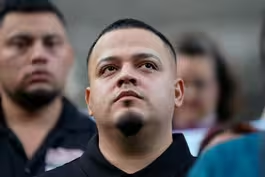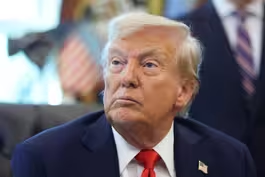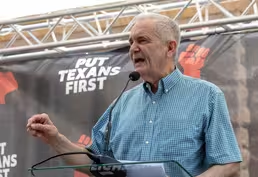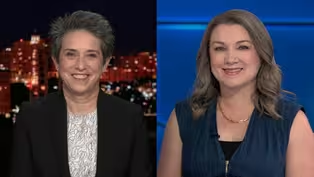
A look why presidents can control D.C.'s law enforcement
Clip: 8/25/2025 | 6m 55sVideo has Closed Captions
A look at D.C.'s unique history and why presidents can wield control of law enforcement
Some of the more than 2,000 National Guard troops on duty in Washington, D.C., are now armed, part of a crackdown that President Trump once again claimed was needed to help curb crime in the city. While he threatened similar actions in other cities, including Chicago and New York, his power to consolidate law enforcement in the nation’s capital is unique. Deema Zein explains.
Problems playing video? | Closed Captioning Feedback
Problems playing video? | Closed Captioning Feedback
Major corporate funding for the PBS News Hour is provided by BDO, BNSF, Consumer Cellular, American Cruise Lines, and Raymond James. Funding for the PBS NewsHour Weekend is provided by...

A look why presidents can control D.C.'s law enforcement
Clip: 8/25/2025 | 6m 55sVideo has Closed Captions
Some of the more than 2,000 National Guard troops on duty in Washington, D.C., are now armed, part of a crackdown that President Trump once again claimed was needed to help curb crime in the city. While he threatened similar actions in other cities, including Chicago and New York, his power to consolidate law enforcement in the nation’s capital is unique. Deema Zein explains.
Problems playing video? | Closed Captioning Feedback
How to Watch PBS News Hour
PBS News Hour is available to stream on pbs.org and the free PBS App, available on iPhone, Apple TV, Android TV, Android smartphones, Amazon Fire TV, Amazon Fire Tablet, Roku, Samsung Smart TV, and Vizio.
Providing Support for PBS.org
Learn Moreabout PBS online sponsorshipAMNA NAWAZ: Some of the more than 2000 National Guard troops on duty in Washington, D.C., are now armed, part of a crackdown President Trump claimed again today was needed to help curb crime in the city.
While he threatens similar actions in other cities, including Chicago and New York, his power to consolidate law enforcement in the nation's capital is unique.
Deema Zein takes a look at why.
DEEMA ZEIN: These last few weeks in Washington, D.C., have been like few others in its history.
PAM BONDI, U.S. Attorney General: Under Donald Trump's directive, D.C., will become safe again and it will become clean again.
MAN: The first of 800 troops arriving in Hummers and dressed in combat camo posted along the National Mall Tuesday.
MAURICE DUBOIS, CBS News: Washington, D.C., filed a lawsuit today challenging the Trump administration's takeover of its police department.
DEEMA ZEIN: President Trump's actions have sparked protests... PROTESTER: Trump must go now!
DEEMA ZEIN: ... and raised questions for many about why he's able to wield control of law enforcement in D.C.
The reasons for that can be traced all the way back to the earliest days of our nation.
J.D.
DICKEY, Author, "Empire of Mud: The Secret History of Washington, D.C.": In the Constitution in Article I, Section 8, it is called the Enclave Clause that talks about how a district of no more than 10 square miles should be created by Congress, which will have exclusive legislation over it.
DEEMA ZEIN: President George Washington selected the final location for the Capitol on the Potomac River.
The result was a federal district that would remain entirely separate from any state, a decision driven in part by fear.
J.D.
DICKEY: The founders of the country were also wary about the mob attacking Congress, because it had happened once before near the end of the Revolutionary War, in which a mutiny of Pennsylvania militia against the Pennsylvania Statehouse occurred, and that happened to be in the same building Congress was meeting in.
So that was interpreted as an attack on Congress and they had to relocate.
STEVE VLADECK, Georgetown University Law Center: And by 1800, the entire national capital had been relocated first from New York, then Philadelphia, and finally to present-day Washington, D.C. DEEMA ZEIN: Residents of the newly created District of Columbia lost their voting rights, even though they pay taxes.
Still, the city rapidly expanded with the growth of the federal government, especially during the Civil War.
J.D.
DICKEY: The city had grown from 75,000 people to 150,000 people, from kind of a Southern backwater to a multiracial cosmopolitan big city.
At the same time, the racial composition was changing as well to about a third of African Americans made up the population.
DEEMA ZEIN: The district made history in 1867, when Congress granted some voting rights to all men over 21, including for the first time African Americans.
But that effort to allow the city's growing Black population a say in how they'd be governed led to backlash.
J.D.
DICKEY: There was a push to disenfranchise the citizenry completely, in other words, not letting them vote for mayor, not letting them vote for their city counselors, and instead have the District completely under the control of Congress.
DEEMA ZEIN: And, by 1874, Congress did just that, leaving D.C. residents without voting rights for almost a century.
GEORGE DEREK MUSGROVE, University of Maryland: Eight hundred thousand residents of the District of Columbia did not have a local government, didn't have a vote in Congress, in fact, until the early 1960s, didn't even vote for president.
(SINGING) DEEMA ZEIN: After years of pressure, which intensified during the civil rights era, Congress began considering how to hand over responsibility of local government to its citizens.
But again racism would shape the debate.
GEORGE DEREK MUSGROVE: Large numbers of people in Congress would talk at length about crime and how they were going to deal with issues of crime in the nation's capital.
They basically kept that law enforcement function in federal hands and away from the city government, which they knew was going to be disproportionately African American because the population was disproportionately African American.
DEEMA ZEIN: A pivotal moment came in 1973.
President Nixon signed the D.C. Home Rule Act into law, allowing citizens here the opportunity to elect both a mayor and a city council.
But both Congress and future presidents kept an enormous amount of power.
GEORGE DEREK MUSGROVE: What it keeps for Congress is oversight of the city's passage of laws, oversight of the city's budget.
The president already had control of the National Guard.
The Home Rule Act maintains that.
The president, of course, appoints the U.S. attorney, who is a chief law enforcement officer in the District.
And then, of course, the president is capable, as he did the other day, to declare an emergency that threatens the federal interest and then take over the Metropolitan Police Department for a period of up to 30 days.
And so the president has -- really has the lion's share of the law enforcement powers in the District.
DEEMA ZEIN: Presidents from both parties have done it throughout history, including Lincoln during the Civil War.
J.D.
DICKEY: The whole city was basically turned into an armed camp and the government was running it, despite local laws about local leaders and things like that.
DEEMA ZEIN: And, in 1968, after Martin Luther King Jr. was assassinated.
STEVE VLADECK: It was president Johnson who used federal troops to help restore order.
As recently as five years ago, it was President Trump who used National Guard units both from within D.C. and outside of D.C. to, at least from his claim, preserve order during and after the George Floyd protests.
DONALD TRUMP, President of the United States: I'm officially invoking Section 740 of the District of Columbia Home Rule Act.
You know what that is.
DEEMA ZEIN: But this is the first time a president has used the law to exert control of the city's police.
And some worry about what it could mean going forward.
STEVE VLADECK: I worry about the circumstances in which presidents might do it in the future, not just during a random stretch of August, but maybe in the run-up to or aftermath of an election.
And that's why I think folks should be especially vigilant and especially concerned any time we see a president relying upon the premise of an emergency to use military force and to use federal control of local law enforcement in our cities.
DEEMA ZEIN: President Trump's takeover of D.C.'s police is due to expire mid-September, but he wants that extended.
And his lawyers are now looking into overturning the 1973 Home Rule Act, meaning the future of how our nation's capital is governed still remains up for debate 235 years after its founding.
For the "PBS News Hour," I'm Deema Zein.
5 journalists killed after Israel strikes Gaza hospital
Video has Closed Captions
Clip: 8/25/2025 | 8m 10s | Another 5 journalists killed after Israel strikes Gaza's largest hospital (8m 10s)
Is a bubble forming as AI investments drive economic growth?
Video has Closed Captions
Clip: 8/25/2025 | 7m 44s | Is a bubble forming as AI investments drive economic growth? (7m 44s)
Kilmar Abrego Garcia's attorney on new deportation effort
Video has Closed Captions
Clip: 8/25/2025 | 7m 7s | Kilmar Abrego Garcia's attorney discusses his case amid new deportation effort (7m 7s)
News Wrap: Trump signs order aimed at flag burning
Video has Closed Captions
Clip: 8/25/2025 | 5m 13s | News Wrap: Trump signs order aimed at flag burning (5m 13s)
Rep. Doggett on redistricting and pushback against Trump
Video has Closed Captions
Clip: 8/25/2025 | 7m 12s | Democratic Rep. Doggett on Texas redistricting battle and party's pushback against Trump (7m 12s)
Tamara Keith and Amy Walter on Newsom's fight against Trump
Video has Closed Captions
Clip: 8/25/2025 | 9m 55s | Tamara Keith and Amy Walter on whether Newsom's tactics against Trump are working (9m 55s)
Providing Support for PBS.org
Learn Moreabout PBS online sponsorshipSupport for PBS provided by:
Major corporate funding for the PBS News Hour is provided by BDO, BNSF, Consumer Cellular, American Cruise Lines, and Raymond James. Funding for the PBS NewsHour Weekend is provided by...
















